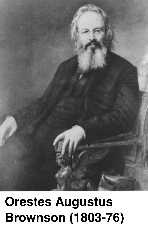

Introduction
to
The American Republic
of
O. A. Brownson
by
Jon Roland
Orestes A. Brownson (1803-1876) was a publisher, essayist, and political and religious philosopher. Self educated, at 19 he became a Presbyterian, but he rejected the judgementalism of that sect, becoming first a Universalist minister in 1826, then a Unitarian minister in 1832, then a Congregationalist minister in 1834, before publishing a successful quarterly journal, the Boston Quarterly Review, beginning in 1838, which later merged in 1842 with another publication to become the U.S. Democratic Review. He wrote a series of essays for this journal on the "Origin and Constitution of Government", which he rewrote in 1865, just after the War of Secession, and published with the title of The American Republic in 1866. In 1844 he had converted to Catholicism and started another publication, Brownson's Quarterly Review, which published from 1844 through 1865, then resumed from 1872 through 1875. He had a large readership, especially among Catholics in his later years, and was considered a leading political thinker of the period.
Brownson's main objective in The American Republic is to resolve the philosophical issues that led to the 1861-65 War of Secession, so much of the book is devoted to developing a theory of government under which the Union was legitimate in opposing the secession of the Southern states. He seeks a synthesis of the theories of earlier political philosophers, offers corrections to what he considers shortcomings in their thinking, and addresses the arguments of such figures as John C. Calhoun, which laid the basis for secession.
His major contribution is to develop the idea that before the people enacted a constitution of government, represented by the written Constitution of 1789, they had an unwritten constitution for the society (which was in turn subject to an unwritten constitution of nature), and that even though they had been organized into independent states, their constitutive act was the legislative act of a single people or society. Essentially, the social constitution was the established custom of making collective decisions by calling conventions, deliberative assemblies which operated according to established rules of order, which had the authority, if called for that purpose, to draft and ratify written constitutions of government, with limited powers to protect rights. He maintained that the states were indeed sovereign, but only as states united, not as states independent.
There are some important weaknesses in Brownson's arguments that caused much controversy. One argument was that if a state were to secede, it would revert to its prior status as a territory of the United States, but he acknowledges that Texas is an exception that does not fit that argument, and glosses over the fact that the original Thirteen States don't fit it, either. He argues that sovereign states cannot merge their sovereignties, but ignores the many modern nations, such as Switzerland, that did result from such mergers. He even speculates about eventually annexing Canada, Mexico, and Central America as more states, voluntarily, the way Texas was annexed, even though they are not just separately organized parts of the same society. He considers some governments despotic or tyrannical, yet seems to recognize the legitimacy of longstanding regimes as supported by the unwritten constitutions of their peoples, and equates de jure with de facto government. He rejects Lockean social compact theory, as he understands it, but advances a theory of a people being formed by Providence, that is, by a shared history and customs, which appears to merely be a vague restatement of the Lockean social compact using theological language. The flaw in his understanding of the social compact theory seems to be that he only understands the compact as arising from a convention in the form of a deliberative assembly, but Locke made it clear that individuals were inducted into the social compact by their parents or guardians, and that the convention was the ongoing "convention" of the whole people, not just a gathering of some of them at a particular meeting place and time.
On the constitutional issues that led to secession, Brownson sides with the Southern states. He argues that the national bank and protective tariffs are unconstitutional, and that the General or Union government has no constitutional power to either prohibit or protect slavery in the states or territories. He asserts a faith that the division of powers between the General and State governments will effectively protect rights, while rejecting the division as a system of checks and balances, and neglects to address the problem of what do the people or states do if and when constitutional bounds are exceeded, as they were, Brownson acknowledges, beginning about 1825, following the Jeffersonian Era. He rejects the solutions of Calhoun without offering alternatives.
Despite the shortcomings of his arguments, one can obtain some valuable insights into the somewhat confused political thinking of the time that has not been straightened out to this day. He at least raises some of the main questions, and points the way toward solutions.
One of the insights is found in the distinction he makes between "territorial" democracy, which he defends as the proper constitution of the people or state, prior to the written Constitution, and the emergent "socialistic' democracy and atavistic "egoistic" democracy, which were the contenders in the War of Secession. He acclaims the defeat of the egoistic, while warning of the rise of the socialistic, which he foresees as being as much a threat, if not a greater one, to the proper territorial democratic constitution underlying the federal constitution. He warns that it will lead to centralization and strengthening of the General government at the expense of the State governments and the Constitution.
Brownson at least advances the political theory of constitutional republican government. Had his writings been more widely read and more influential when they first appeared, the War of Secession might have been avoided. As such, he stands as an unheeded prophet, some of whose warnings remain relevant to us in the 21st century.